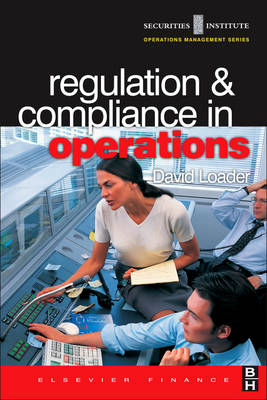
Regulation and Compliance in Operations
Seiten
2003
Butterworth-Heinemann Ltd (Verlag)
978-0-7506-5487-6 (ISBN)
Butterworth-Heinemann Ltd (Verlag)
978-0-7506-5487-6 (ISBN)
- Keine Verlagsinformationen verfügbar
- Artikel merken
Presents a look at how regulation affects the operations function by focusing on regulatory issues and drivers. This book explains the role of regulation and compliance in UK, US and global financial markets and provides a perspective from the operations department viewpoint without getting caught up in the minute details of regulations.
'Regulation and Compliance in Operations' looks at how regulation affects the operations function by focusing on regulatory issues and drivers. As regulatory demands ever increasing, it is important for operations teams to be aware of the important regulatory issues which exist globally.
Like any other part of an organization in the financial services industry, operations has rules and regulations to comply with. Although many view regulation as being about rooting out rogue traders and controlling speculators, its role is much more profound than this, and without it many more 'scandals' would undoubtedly occur.
The problem for the regulator is that unless total oversight of every transaction, account, business and individual can be made, there will always be rogue traders or more recent examples like Enron and World.Com. As such intense oversight is not practical, the regulator can only do so much, with most of the responsibility resting with the firms and organizations themselves.
For operations teams their role in protecting the firm stems from their ability to manage critical processes like reconciliation, asset position agreements and the nostro accounts efficiently and effectively. Regulators need the help and support of the businesses to have a 'business-friendly environment'. When some abuse the trust placed in them and the regulatory environment, a 'scandal' or worse occurs, with the result that the majority are penalized as regulators react to criticism and apply more onerous regulations.
It is often the operations teams that bear most, or at least some, of the repercussions of greater regulatory oversight of the business. It is therefore vitally important for operations teams to have a firm understanding of the regulatory issues and drivers. This book will help you gain that understanding, as well as looking at the important regulatory issues in the various global markets in which your business operates.
'Regulation and Compliance in Operations' looks at how regulation affects the operations function by focusing on regulatory issues and drivers. As regulatory demands ever increasing, it is important for operations teams to be aware of the important regulatory issues which exist globally.
Like any other part of an organization in the financial services industry, operations has rules and regulations to comply with. Although many view regulation as being about rooting out rogue traders and controlling speculators, its role is much more profound than this, and without it many more 'scandals' would undoubtedly occur.
The problem for the regulator is that unless total oversight of every transaction, account, business and individual can be made, there will always be rogue traders or more recent examples like Enron and World.Com. As such intense oversight is not practical, the regulator can only do so much, with most of the responsibility resting with the firms and organizations themselves.
For operations teams their role in protecting the firm stems from their ability to manage critical processes like reconciliation, asset position agreements and the nostro accounts efficiently and effectively. Regulators need the help and support of the businesses to have a 'business-friendly environment'. When some abuse the trust placed in them and the regulatory environment, a 'scandal' or worse occurs, with the result that the majority are penalized as regulators react to criticism and apply more onerous regulations.
It is often the operations teams that bear most, or at least some, of the repercussions of greater regulatory oversight of the business. It is therefore vitally important for operations teams to have a firm understanding of the regulatory issues and drivers. This book will help you gain that understanding, as well as looking at the important regulatory issues in the various global markets in which your business operates.
David Loader is the cofounder of DSC Portfolios Ltd., which specializes in global training and consultancy services for the financial industry. He has worked in the debt, equity, and derivatives markets, and his expertise in back-office dynamics is unparalleled. He has written widely on operations management, derivatives, fund administration, and operational risk.
Preface; What is regulation? - the practical view; Regulation and compliance in different markets; Compliance and operations; Client protection; Money laundering; Fraud and insider dealing; Operations and breaches of regulations; The future; Appendices; Glossary.
| Erscheint lt. Verlag | 5.12.2003 |
|---|---|
| Reihe/Serie | Securities Institute Operations Management |
| Verlagsort | Oxford |
| Sprache | englisch |
| Maße | 165 x 234 mm |
| Gewicht | 360 g |
| Themenwelt | Wirtschaft ► Betriebswirtschaft / Management ► Finanzierung |
| Betriebswirtschaft / Management ► Spezielle Betriebswirtschaftslehre ► Bankbetriebslehre | |
| ISBN-10 | 0-7506-5487-2 / 0750654872 |
| ISBN-13 | 978-0-7506-5487-6 / 9780750654876 |
| Zustand | Neuware |
| Haben Sie eine Frage zum Produkt? |
Mehr entdecken
aus dem Bereich
aus dem Bereich
denken und handeln wie ein professioneller Trader
Buch | Softcover (2023)
Vahlen, Franz (Verlag)
36,90 €


